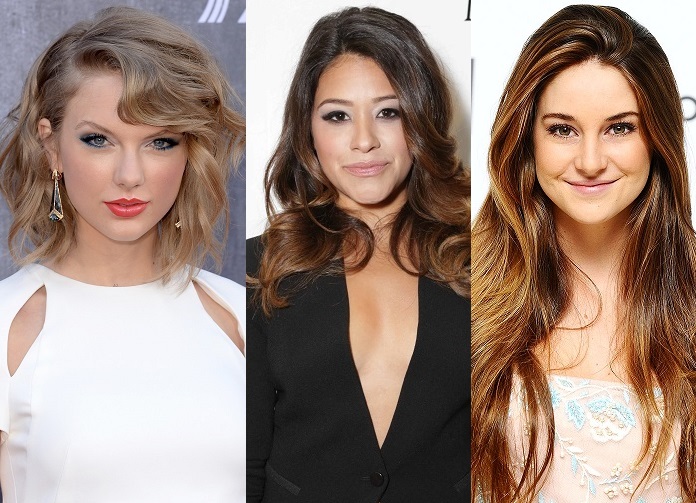[Taylor Swift, Gina Rodriguez, Shailene Woodley]
It’s become almost de riguer for red-carpet journalists (and others) to confront a female celebrity and demand to know whether or not she considers herself a feminist.
This bothers me.
From what I’ve seen, most of the time the publication asking doesn’t have any vested interest in their answer (see, a Time magazine writer asking Shailene this question, and then another turning right around and putting “feminist” on their “words to ban” poll). This leads me to believe that these people aren’t confronting these women because they care about feminism, or want to help overturn some of the misconceptions about feminism– they just want headlines and clicks and shares, and they don’t really care how it happens.
Unfortunately, throwing “are you a feminist, huh, huh?” in a woman’s face seems to work for the whole “getting page views” thing that drives the capitalist internet—especially if she answers the question “badly”—if she says no. Things become even more interesting if she explains why she’s not a feminist, because it usually has something to do with misconceptions about feminism (“I don’t hate men” being one of the most common reactions).
And the reporter and the editor chuckle gleefully together and they take it to the presses and the misconceptions are reinforced and feminists have to waste more time explaining that no, that’s not what feminism is. I swear, we don’t hate men …
This bothers me because it’s not fair to do this to anyone, especially women whose entire lives are in the public eye and if they say “Yes, absolutely I’m a feminist!” they’ll be vilified and hated by some very disgusting people who are willing to harass and attack them for years, and if they say “no, I’m not,” a bunch of people (who, personally, I think are being a little bit ridiculous) get all upset with their sputtering “well, why not? DON’T YOU BELIEVE IN EQUALITY?!”
And that is exactly the problem, because anyone who isn’t an outspoken misogynist is going to respond with “well, of course I believe in equality!” At this point in our culture, I think it’s pretty rare for a person to consciously choose to believe that men and women should be treated unequally.
And while, at its most absolutely basic articulation, feminism is “the belief that the genders should be treated equally,” I feel that this definition is woefully unhelpful.
For example, complementarianism is a methodology espoused by many, probably most, conservative Christians leaders. Complementarianism is sexist, and cannot be divorced from its extremely misogynistic roots—both from the original texts that biblical scholars pull from and from the way it’s been disseminated throughout Christendom. Complementarianism is based on the idea that men and women have been given “different roles,” with men being leaders, teachers, pastors, elders, and kings, and women being submissive, obedient, silent and completely barred from any form of leadership. The point of complementarianism is to treat men and women unequally.
However, every single complementarian teacher will shout until they are blue in the face that what they teach has nothing whatsoever to do with whether or not men and women are equal. Of course men and women are equal, they’ll say—they are ontologically equal, and everyone is equally cherished by God. We’re just given different roles. That’s not a statement about which one is worthier than the other, or more valuable, they’ll argue. Pay no attention to the fact that men are the only ones qualified to be in charge of anything. That’s not inequality. That’s just our purpose.
To any feminist, that argument is nonsensical, but if you ask John Piper or Mark Driscoll if men and women should be treated “equally” they’ll say “of course!” but then saying well, that means you’re a feminist in response would be absurd because they are not.
There’s a really big idea shoved into the Merriam-Webster definition that rarely gets unpacked in conversations about whether or not such-and-such female celebrity says she is one or not.
Feminism is the belief that all genders should have equal rights and opportunities.
Inside of those words is a dizzying world of academic and social discussion, intersections of injustice and oppressions, conversations about race and gender and toxic masculinity and benevolent sexism and ableism and heteronormativity. Feminism is more than just the belief that men and women are equal, but how men and women and other genders live.
Feminists are dedicated to dismantling the systemic oppressions that affect women, especially the ones that we all tend to be unconscious of. We fight against internalized misogyny and the need many women feel not to be “One of Those Girls,” whatever those girls might be. We point to ways that whole career fields are hostile to women. We examine how gender roles and stereotypes affect all of us, no matter our gender, and how our communities police these things in sometimes brutal ways.
I don’t think it’s fair to demand that everyone self-identify as a feminist. To me, being a feminist is big work. It’s a commitment. Being a feminist means that when any one of my friends says or does something sexist, I am willing to say something about it, right then, on the spot, no matter the blowback and pressure I might face from others to “not make such a big deal out of it.” It’s a promise to constantly be educating to myself, to always listen to the experiences of women, especially women who experience a different set of intersectional oppressions.
I don’t want to appoint myself as some sort of feminist gatekeeper. Feminism is not a monolith. Feminism is an awfully big tent, filled with many people who can vociferously disagree because we are human beings and that’s inevitably going to happen. I, however, do wish everyone in the world would listen to feminists and think “hey, that makes a lot of sense!” and I’m hopeful that someday that dream will be a reality.
But, for now, there’s a big, uphill battle in front of all of us, and I don’t think handing over a note on the red carpet that asks “are you a feminist? check yes or no” is really helping anybody.


